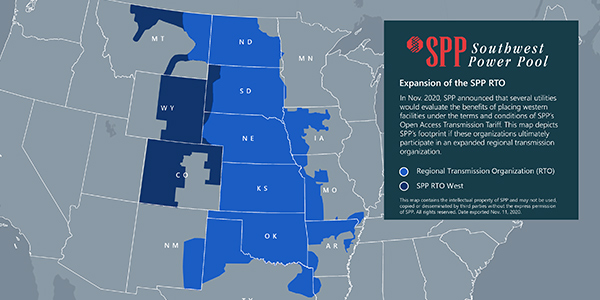SPP signaled it could be on the verge of further expanding its RTO footprint with an announcement Thursday that several Western utilities are committed to evaluating membership in its regional electricity market.
Basin Electric Power Cooperative, Deseret Power Electric Cooperative, the Municipal Energy Agency of Nebraska (MEAN), Tri-State Generation and Transmission Association and the Western Area Power Administration would become the first SPP members to have facilities in the Western Interconnection under the RTO’s Tariff.
WAPA’s membership would include participation of its Upper Great Plains-West (UGP-West) region and Loveland Area Projects, the RTO said.
The utilities, some already members of SPP in the Eastern Interconnection, have all sent letters expressing their interest in placing their Western facilities under the RTO’s Tariff. The letters indicate they will work with SPP to evaluate the terms, costs and benefits of doing so, the grid operator said.
Tri-State staked out a leadership position within the group, devoting part of a Thursday press conference with Colorado Gov. Jared Polis to extoll the benefits of RTO membership. The virtual event was to highlight Tri-State’s electric resource plan, to be filed with the Colorado Public Utilities Commission next month, that will “dramatically” increase its renewable resources and reduce emissions. Under Polis, Colorado has established a goal of 100% renewable energy by 2040.
Tri-State CEO Duane Highley said connecting the West’s solar capacity with the East’s abundant wind capacity — Kansas and Oklahoma both produce more wind energy than they can use — will efficiently facilitate the transfer of additional generating resources across the regions and offer an opportunity for greater solar resource development.
“The next step for us is to help develop an RTO in the West,” Highley said. “In order to [meet our emission-reduction targets], we know we have to coordinate regionally. We want to do everything we can to accelerate this transition to a regional grid. This doesn’t eliminate any of the other options. … We know we have to improve transmission access.”
Noting SPP has seen renewable energy account for nearly 80% of its fuel mix at times, Highley said “we’re going to need that same coordination as we build and integrate renewables into a broad region.”
“Enhancing regional markets will lead to additional efficiencies, reliability and more cost savings,” Polis said, echoing Highley. “[RTOs] are really important to support the integrity of a higher level of renewables across a broader geographic area.”
“We’ve enhanced electric reliability while integrating more renewable generation than many in our industry ever thought possible; modernized the grid; built and operated a dependable and economic market; and equitably allocated the costs and revenues associated with these and other services,” SPP CEO Barbara Sugg said in a statement. “What’s more, we’ve done it all while staying true to our collaborative and member-driven business model, and now we’re excited for the opportunity to bring the value of RTO membership to new customers in the West.”
‘Substantial Benefits’
SPP said a Brattle Group study conducted for the RTO found the move would be mutually beneficial and produce $49 million in annual savings for current and new members. Western utilities would receive $25 million a year in adjusted production cost savings and revenue from off-system sales. Members in the Eastern Interconnection would benefit from $24 million in savings because of the market’s expansion, transmission network and generation fleet.
An SPP spokesman said the report would be shared publicly once it has been reviewed by the membership in December.
“We anticipate the benefits of these entities joining our RTO to exceed those quantified in the study,” SPP’s Derek Wingfield said. The study’s scope was limited only to adjusted production cost savings and the value of off-system sales.
“But there are numerous other, substantial benefits of RTO membership as we’ve demonstrated for years in the Eastern Interconnection,” he said. “We at SPP hope the evaluation of full RTO membership leads to even more chances to help Western stakeholders lower energy costs, integrate more renewable energy and modernize the grid.”
Tri-State, Basin Electric, MEAN and WAPA’s UGP-East joined SPP in 2015, along with the rest of the Integrated System. (See Integrated System to Join SPP Market Oct. 1.)
The utilities and Deseret are also customers of at least one of SPP’s contract-based Western Energy Services, which includes reliability coordination and its Western Energy Imbalance Service real-time market scheduled to launch in February 2021. SPP’s Western RC service will celebrate its one-year anniversary in December.
Tri-State was part of the Mountain West Transmission Group, a coalition of 10 Western utilities that briefly pursued SPP membership in 2017 and 2018. The effort fell apart when Xcel Energy left the group and later committed to join CAISO’s Energy Imbalance Market. (See Xcel Leaving Mountain West; SPP Integration at Risk.)
Tri-State spokesman Mark Stutz said Mountain West’s failure did not end the utility’s “long-term interest in and goal to ultimately participate in a regional transmission organization for our region.”
“Tri-State’s participation in a Western Interconnect RTO is essential to advance our members’ reliability, affordability and clean energy goals,” Stutz said. “While the issues are complex, we remain optimistic that together we are on a path that can capture the full benefits of an organized market in the West.”
SPP’s expansion would add Colorado and Wyoming to the RTO footprint, which would then encompass all or part of 15 states.





